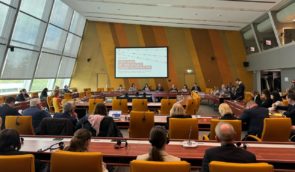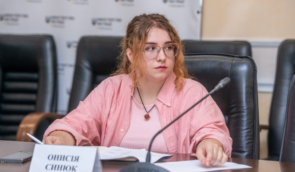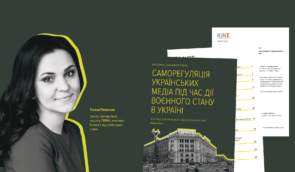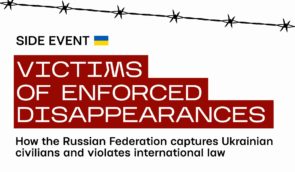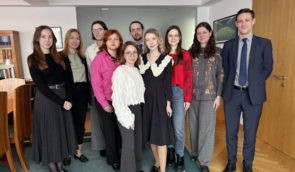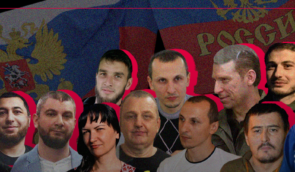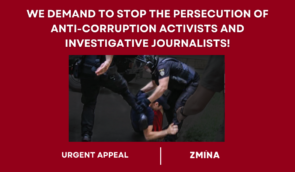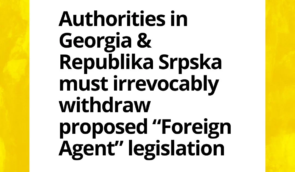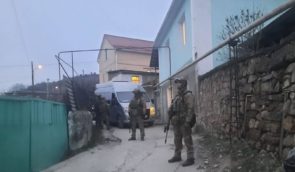Life of Crimean Tatars under occupation: ZMINA organised a conference in the European Parliament
Human Rights Centre ZMINA, with the support of the Mission of Ukraine to the EU and the Office of Member of the European Parliament Anna Fotyga organised a conference “Crimean Tatars after February 2022” at the European Parliament in Brussels. The event was dedicated to a tragic date — 18 May, which marks the Day of Remembrance of the victims of the genocide of the Crimean Tatar people.
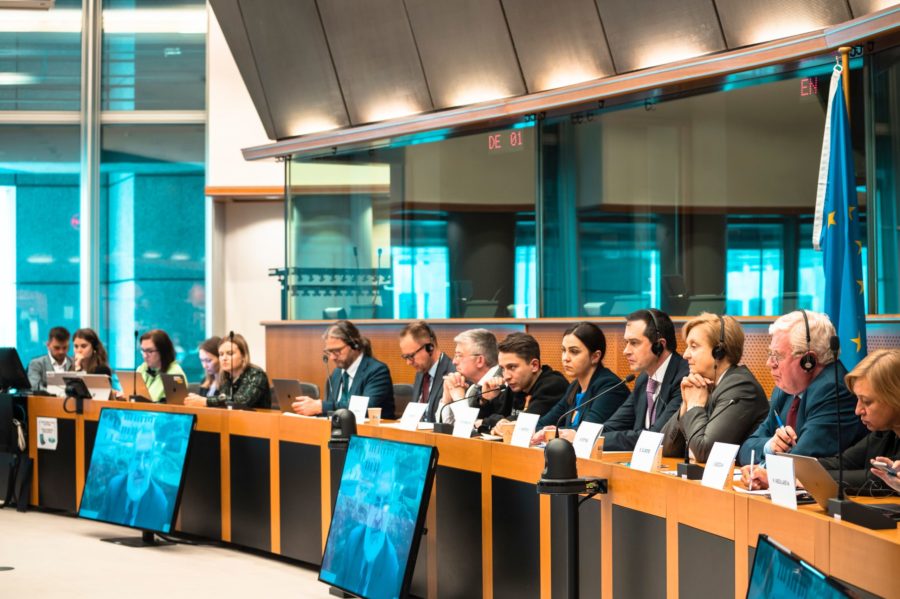
The conference was opened by the First Deputy Minister of Foreign Affairs of Ukraine Emine Dzhaparova, the Chairman of Medjlis of the Crimean Tatar People Refat Chubarov, the Permanent Representative of the President of Ukraine in Crimea Tamila Tasheva, the Ambassador of Ukraine to the EU Vsevolod Chentsov and the EU Special Representative for Human Rights Eamon Gilmore.
The panel moderated by Tetiana Pechonchyk from ZMINA started by reminding the history of the date which gathered the conference participants.
“On the night of May 17-18, 1944, the entire Crimean Tatar people were deported — they were taken to Central Asia and the Urals in livestock wagons. As a result of deportation, over 46.2% of them died. It was a genocide of the Crimean Tatar people. Crimean Tatars persistently demanded the restoration of their rights, return to the homeland, and protection of their native language and culture. The national movement of the Crimean Tatars chose a non-violent path of struggle and achieved the return to Crimea in the early 90s of the 20th century,” told the Crimean Tatar historian and journalist Gulnara Abdulaieva.
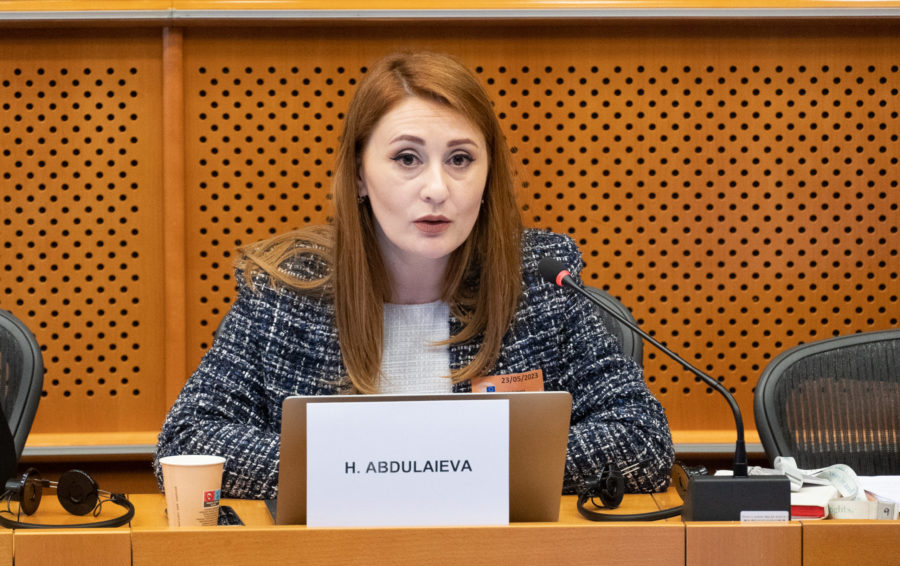 Photo: Gulnara Abdulaieva
Photo: Gulnara Abdulaieva“On June 26, 1991, the second Kurultai began its work in Simferopol, which elected the only higher representative body of the Crimean Tatar people — Mejlis. Crimean Tatars decided to be part of independent Ukraine then,” added Abdulaieva. However, a little over 20 years have passed, and in 2014, Ukrainian Crimea suffered the second Russian occupation. A wave of political persecution, searches, and arrests started in the first months of the occupation. The Mejlis was announced as an extremist organization, some of its representatives were forced to leave the peninsula, and those who remained in Crimea were in danger and the entire peninsula’s population.
“According to the Crimean Tatar Resource Center, a total of 287 political prisoners were prosecuted in criminal cases during the occupation of Crimea, 195 of them — representatives of the indigenous Crimean Tatar people; 167 persons are in prisons now, of whom 116 are Crimean Tatars; restrictions or a probationary period were imposed against 37 persons, including 19 Crimean Tatars; 32 persons are persecuted, of whom 26 are Crimean Tatars; 60 persons died, 28 of whom Crimean Tatars,” stated the Member of the Mejlis of the Crimean Tatar people and the Head of the Crimean Tatar Resource Center Eskender Bariev.
He highlighted that, for the first time since the occupation, the Russians used violent psychiatric treatment against the political prisoner Mamed Dovhopolov — he was placed in a psychiatric asylum for five years.
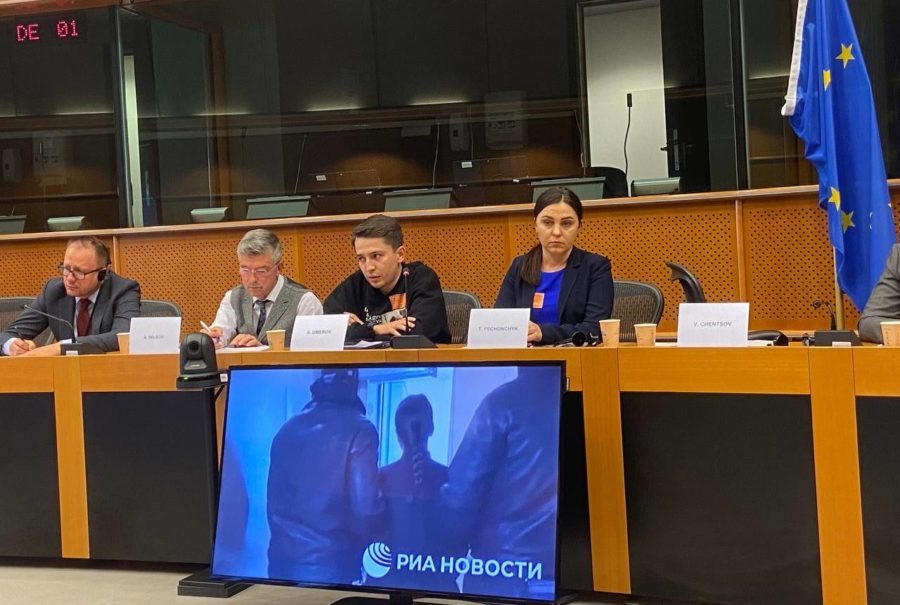 Photo: Video with illegally detained Leniie Umerova
Photo: Video with illegally detained Leniie UmerovaAziz Umerov told the story of his sister, political prisoner Leniie Umerova: “Russia threw my sister behind bars. They apprehended her when she was crossing the border from Georgia to Russia on her way to the occupied Evpatoria to take care of our cancer-ill father. Because of Russians, her journey home turned into freedom deprivation and espionage accusations. Leniie is being held in FSB’s detention center “Lefortovo,” completely isolated from the outside world, right in the heart of the evil empire — Moscow.” Leniie faces up to 20 years of imprisonment under trumped-up charges now.
“Nariman Dzhelyal, brothers Asan and Aziz Akhtemov were sentenced from 13 to 17 years in prison on sabotage charges. They have never been in the place of alleged commitment to the crime attributed to them. The damage to the gas pipe was calculated at around 100 thousand rubles. It has already been paid 15 times in the form of fines. But no, it is necessary to punish activists for their civic position: here you go, get in total 45 years in prison for three people,” told the Editor-in-chief of the newspaper Qirim Bekir Mamut.
He also shared the story of Abdureshyt Dzhepparov — a well-known human rights activist in Crimea accused of discrediting the Russian army and abusing freedom of information.
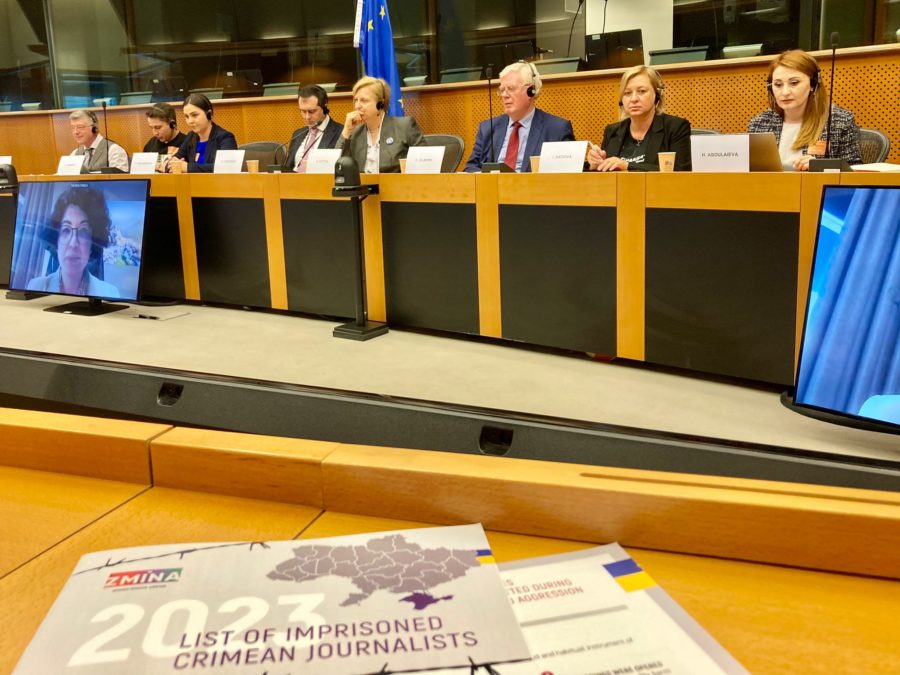
Iryna Siedova, the expert of the Crimean Human Rights Group, told the story of another political prisoner — Iryna Danylovych: “She was kidnapped on the street during the daytime, and a criminal case was falsified against her with the help of torture. She was sentenced to 7 years in prison for writing socially significant texts online. This is not an isolated case; at least 15 journalists and bloggers were arrested for their activities in the temporarily occupied Crimea.“
Siedova underlined that brutal violations of human rights and persecution are committed not only against the indigenous people of Crimea and Ukrainians but also against citizens of foreign countries: the Spanish volunteer Mariano García Calatayud is detained and held incommunicado in Simferopol pretrial detention center.
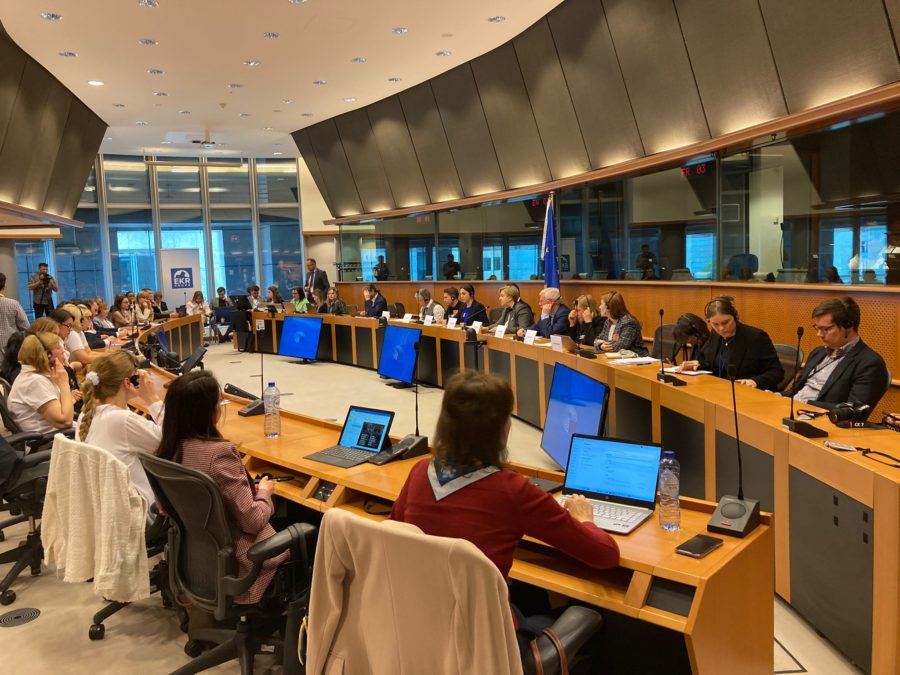
Ukrainian human rights defenders, relatives, and colleagues of the political prisoners called the international society for action: “Right now, in Ukraine, we are fighting for peace and triumph of democracy. Thus we ask you to fight for our people.” They called to demand the release of all illegally detained citizens of Ukraine, to establish effective mechanisms for the release of civilian captives held by Russia, to establish mechanisms to ensure the prosecution of the leadership of the Russian Federation and all war criminals, to gather and streamline data on all individuals involved in illegal detentions, cruel and degrading treatment of civilians, and impose personal sanctions on them, to spread the stories of political prisoners, civilian hostages and prisoners of war.
Joint efforts and the powerful help of our European colleagues will end this baseless aggression of Russia against Ukraine. In this vein, the Ambassador of Ukraine to the EU Vsevolod Chentsov stated: “The occupation of Crimea started back in 2014 and we hope that the liberation of Ukraine will also start with Crimea. People in Crimea feel the wind of liberation blowing while Russians are scared because the one with a goal and desire will certainly find a way and win.“
“Needs of Crimean Tatars are tremendous today, but one day, they will become part of our family. I look forward to the day when representatives of Crimean Tatar people will become Ukrainian members of the European Parliament taking their place in the diverse family of the peoples of Europe,” proclaimed Eamon Gilmore, the EU Special Representative for Human Rights.
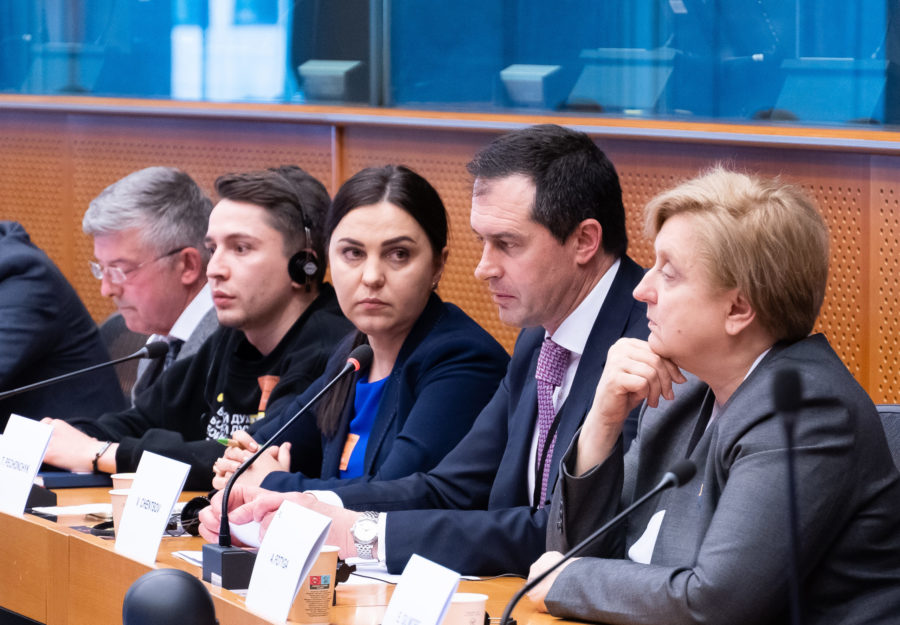
In addition, ZMINA used its visit to the European Parliament for advocacy meetings with the representatives of the European Conservatives and Reformists Group, the European People’s Party Group, the Group of the Greens, and the President of the European Parliament Roberta Metsola.
ZMINA has also organized an exhibition and a film screening and held meetings with the EEAS, the European Commission, the Delegation of the EU to Ukraine, and the Representation of Poland to the EU while in Brussels.
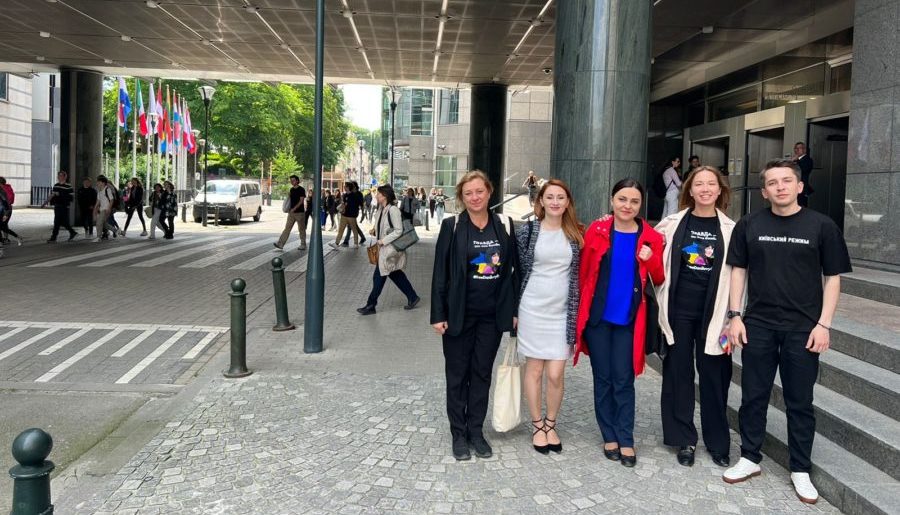
Photo credits: ZMINA, Human Rights House Foundation and Office of MEP Anna Fotyga

